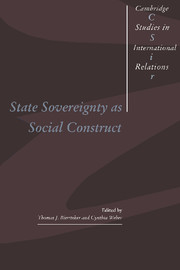Book contents
- Frontmatter
- Contents
- List of figures
- List of contributors
- Acknowledgments
- 1 The social construction of state sovereignty
- 2 Contested sovereignty: the social construction of colonial imperialism
- 3 Beyond the sovereignty dilemma: quasi-states as social construct
- 4 The sovereign state system as political-territorial ideal: historical and contemporary considerations
- 5 Sovereignty and the nation: constructing the boundaries of national identity
- 6 Sovereignty, nationalism, and regional order in the Arab states system
- 7 Binding sovereigns: authorities, structures, and geopolitics in Philadelphian systems
- 8 Hierarchy under anarchy: informal empire and the East German state
- 9 Reconstructing the analysis of sovereignty: concluding reflections and directions for future research
- Index
- Titles in the series
3 - Beyond the sovereignty dilemma: quasi-states as social construct
Published online by Cambridge University Press: 01 June 2011
- Frontmatter
- Contents
- List of figures
- List of contributors
- Acknowledgments
- 1 The social construction of state sovereignty
- 2 Contested sovereignty: the social construction of colonial imperialism
- 3 Beyond the sovereignty dilemma: quasi-states as social construct
- 4 The sovereign state system as political-territorial ideal: historical and contemporary considerations
- 5 Sovereignty and the nation: constructing the boundaries of national identity
- 6 Sovereignty, nationalism, and regional order in the Arab states system
- 7 Binding sovereigns: authorities, structures, and geopolitics in Philadelphian systems
- 8 Hierarchy under anarchy: informal empire and the East German state
- 9 Reconstructing the analysis of sovereignty: concluding reflections and directions for future research
- Index
- Titles in the series
Summary
A critical reflection of the end of the Cold War, the collapse of a number of states, and the subsequent interest in humanitarian intervention suggest the ambiguities surrounding the idea of sovereignty. On the one hand, scholars and policymakers increasingly argue that the principle of sovereignty acts as an impediment toward improving the global condition. Individual states appeal to the principle of nonintervention in their internal politics (one of the central features of sovereignty), thereby constraining global humanitarian movements. Unless permission is granted by individual states, sovereignty limits international action against, for example, human rights violations, persecution or genocide of ethnic or religious minorities, internal colonialism, starvation, and environmental concerns such as the depletion of rain forests. Sovereignty provides individual states with a license to purify their domain of opposition, silence alternative voices, and eliminate dissent. In short, the principle of sovereignty shields states' internal deficiencies and failings against external pressure and action. On the other hand, sovereignty remains a significant value in the context of international society as a whole. Its principle of nonintervention constrains traditional empire building and curbs the use of force by the powerful against the less powerful. Its principle of self-determination allows for a diversity of states to construct their projects according to the resonance of their own meanings. It allows, therefore, for a tolerance of ideological differences. Further, an international society based on the principle of sovereignty may be seen as a type of decentralized democracy where ideological differences can be discussed and debated without degenerating into the habitual use of absolute force.
- Type
- Chapter
- Information
- State Sovereignty as Social Construct , pp. 50 - 80Publisher: Cambridge University PressPrint publication year: 1996
- 19
- Cited by



